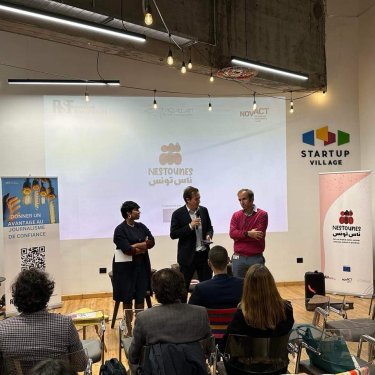RSF launches NesTounes project to strengthen quality of journalism in Tunisia

With European Union support, Reporters Without Borders (RSF) and several Tunisian civil society organisations are launching a three-year project in Tunisia to boost the financial and editorial independence of media outlets, reinforce journalistic skills, and promote a pluralistic information arena by means of personalised grants and training.
Called NesTounes, which means “Tunisian Citizens” in Arabic, the project aims to support independent media at time when the environment for journalism is worsening in Tunisia, its media are experiencing economic problems, and young people now prefer visual media content.
RSF and its partners – the Taqallam Association for Freedom of Expression and Creativity and the International Institute for Nonviolent Action (NOVACT) – will organise a series of workshops and training sessions and provide grants to promote an inclusive and pluralistic media space.
By means of projects that will be put out to bid in February, Tunisian media and civil society organisations working mainly on societal and economic-related issues will be supported in the production and dissemination of innovative and attractive journalistic content.
Technical and financial assistance will also be offered to media that want to obtain certification with the Journalism Trust Initiative, which RSF launched to promote quality reporting and respect for journalistic ethics by encouraging compliance with a set of standards developed under the aegis of the International Organisation for Standardisation.
“The NesTounes project aims to serve as a safeguard for independence, offering an integrated approach by undertaking to consolidate democratic achievements, strengthen the individual and institutional capacities of civil society organisations, and promote gender equality.
Mohamed Taieb Chmengui, the president of the Tunisian Union of Associative Media (UTMA), regards the project as “very important for the media scene in Tunisia, especially for associative media entities that represent local media, and especially in the interior of the country, because the situation of associative radio stations deserves support, assistance and supervision.”
The NesTounes project’s launch marks a crucial step in RSF’s efforts to promote and assist independent journalism and strengthen ethical standards throughout the global media landscape.
